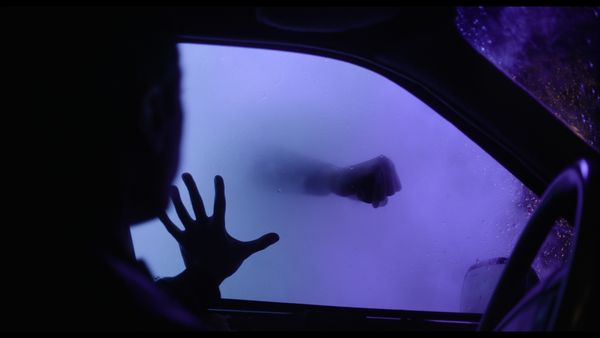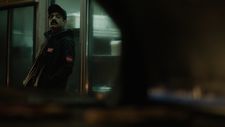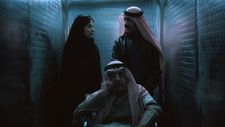 |
| Night Courier |
Saudi Arabian director Ali Kalthami's debut feature, Night Courier (Mandoob), centres on unfortunate Riyadh delivery driver Fahad Nassir (Mohammed Aldokhi), who finds himself caught up in illegal bootlegging to help his ailing father. The dark comedic thriller offers audiences an intimate view of Saudi's rising global city and peers into its dark underbelly.
In conversation with Eye For Film, Kalthami discussed how bootleg movies and online message boards nurtured his love of cinema, his interest in alternative cultural points of view, and representing other people's voices and stories.
Paul Risker: Why filmmaking as a means of creative expression? Was there an inspirational or defining moment for you personally?
Ali Kalthami: I used to watch a lot of films, but in Saudi Arabia, in the 1990s, there was not a place you could go and watch anything. There weren't any cinemas and that created an urge in me to go and find films. So, I would go and rent bootleg movies and navigate those. There was no IMDB, it was just an open field of good luck. The internet had just started with forums where you could discuss films. I found a Kuwaiti website frequented by film buffs, and I'd read their discussions and pick out the names of films. And that grew and I consumed so many movies.
 |
| Night Courier |
My culture has been a verbal one in terms of storytelling. I'd watch my father tell stories to 40 people, all sitting listening to him. I grew up listening to my father, but I didn't know he was so good at telling stories until now. As a filmmaker, I noticed his techniques, and while telling a story is something I lived with, I didn't think it was something I could do. So, there was no firm decision that I was going to be a filmmaker.
I wanted to do this and express myself, but I didn't know anyone in the industry. I didn't knock on doors, but there weren't a lot of doors to knock on actually. So, I started experimenting on the internet in 2010. I failed a lot, but it fuelled me to continue.
PR: Were there any particular films that you saw on bootleg that drew your attention?
AK: I remember in the beginning that I loved actors because they were the face of the story. The first two actors were Denzel Washington and Robert De Niro. I don't know if I can say they were idols, but they were manly figures in my life back then.
I thought, 'I like this film of Denzel's, but I also like that film', and I noticed it has to do with the filmmaker. I then remember noticing the story and the technique, and how a film was shot and performed when I saw Goodfellas and Fight Club. In those two films the director is present, and you can feel the style. This helped me to track backwards to look at films [David] Fincher and [Martin] Scorsese had done before. I started mapping out their films, but the bootleg store wouldn't provide these others. They were either very old films from the Fifties or the Seventies, or they didn't have them for some reason. Those films I saw guided me to the filmmakers and those filmmakers to those before them. So, it trickled down and the internet made it easier because there were no festivals or programmes about cinema.
PR: Have you tried to fill Night Courier with your presence in a noticeable way?
AK: Yes, that is something with a first feature that directors tend to do. I used to be even worse with my early shorts, but as you mature you let go. You want to do the story and characters justice rather than just be present. But you can't help it in the first film because you want to do everything - "I might fail and not get to do it again, so just let me do it." But you can see in films by directors I appreciate, their sense of presence as a filmmaker filters into the film so you don't feel it anymore. You're just watching the story, but their first films are on the nose - "I'm the director, this is my film."
PR: Are there any filmmakers you're thinking of in particular?
AK: Paul Thomas Anderson! His first film, Hard Eight and then Boogie Nights, you can see his influences. There's the Scorsese influence over the camera movement and the editing techniques, but he progressed to be a chameleon in his films. Boogie Nights and The Master are so different, but the scripting and his point of view of his characters are the same. He's a filmmaker I appreciate for his modesty and the respect he has for his films. You don't feel like his films are directed. Instead, you somehow feel like it's just happening.
PR: Night Courier offers an opportunity for audiences to see Saudi Arabia from a different point of view than the mainstream media offers. It's a film to be appreciated as both a story and the view of a country from a rare perspective.
AK: Absolutely, and I remember having that experience with Jewish filmmakers. In Saudi, the way I was raised it was taboo. There's a disconnect, but seeing the Safdie Brothers and other great filmmakers and their stories dazzle you because it's direct communication with somebody without filters. It's a great human experience to watch cinema and to see the point of view of somebody different from you. Maybe they are the opposite of you and from a different culture, and you see things you can relate to.
 |
| Night Courier |
PR: Night Courier is filled with universal experiences around workplace conflict, the need to be financially self-sufficient, and to fulfil one's aspirations.
AK: You want to humanise your characters by drawing from real experiences and giving them something people can relate to. And you want to stay true to your own culture and environment. When I watch a film from Thailand or Russia, America or England, I look for people with those perspectives on a very specific life that are different to mine, and there's so much inspiration in that approach.
PR: Picking up on your point about drawing on real experiences, how did you blur that line between fiction and reality? And, what compelled you to tell this story now?
AK: If you want to speak about creativity, narrative and storytelling, it's the ability to draw connections between things that usually don't connect. There were so many elements in this story that I drew from either real stories and events or made-up ones.
I remember, during the pandemic we were staying home and relied on delivery people. They became an important part of my life and that made me remember an event prior to the pandemic when I went to this gathering at a friend's house. There were a lot of people, some were famous, and a guy walked in delivering food. Nobody paid any attention to him - he didn't exist in that room, but he looked around for recognition. I locked eyes with him, and I remember that when I was at university, I worked in a service section. Some people would say nothing, and they'd hand me the money for their goods. But there was always someone that would look me in the eye and say hello, and that made my day back then. So, when I saw him, and he saw me, we smiled at one another, and that moment is in the film.
Even the scene with the fire extinguisher and the boss is something that happened to one of my friends, and so, these stories connect. I felt it could work, and it was a story I needed to tell now because Saudi is becoming a global country, especially Riyadh, that has the feel of a global city with its delivery drivers and capitalism, and people chasing the dream. It's becoming a city I used to see in movies. Those cities have their own stories and their characters, even lonely people. It's a story for now because we're going through a change that will impact this story.
PR: Night Courier is focused on themes of morality and how a society often works against people, pushing them to breaking point. We should sympathise or empathise with people who find themselves in this position, whether it's because of the wealth gap, power imbalances, or people being devalued instead of being built up.
AK: I come from humble beginnings, and I feel we are somehow driven to be robots. The system of competition makes you aggressive, and the moral compass is lost in the competitive world. The emotion driving my protagonist is what do you do if you're backed into a corner? Are you going to turn to violence? Are you going to be heard? I think he's misunderstood, and I sympathise with these types of characters - the misunderstood and the underdog, who are fair people.
Audiences feel this character relates to them and there was a big discussion between my co-writer and I about him, the moral of the story, being patient and communicative and not being within yourself but reaching out. As humans, we're just asking questions about what's right and what's wrong, so how does the story revolve around that? What does that do to us if we're in his position? Is he doing it for selfish reasons? I like films that ask questions and make you think. I hope we do that because it's what I aspire to do.
In Saudi, morality is something we aspire to as a culture - it's always in our discourse, but seeing it in a character who is dealing with the dangers, and what's prohibited, creates a larger discussion. That was what was happening around the film, and I'm happy about that.
PR: For art to thrive, it has to be discussed, and if not discussed, then thought about, which hopefully creates conversation.
AK: The lead actor and I went to a theatre to say hi to the audience. One 60-year-old man hadn't been to the cinema before. I can tell someone that goes to the cinema and someone who goes with their kids. He came with his teenage kids, and tearing up, he grabbed the actor and said thank you for making this film. Mohamad got emotional because he understood this man was probably a lonely person who was dealing with change, and he'd seen something he'd never seen before. He'd never expected to see this in Saudi, in a cinema. So, it's healthy to make these types of films that make you reflect and think, and make you feel like you're heard, and someone cares about you and presents your voice and story.
Night Courier was released theatrically in the UK and Ireland on Friday 30 August 2024 by Metis Films. For more information visit https://www.mandoob.film.





















